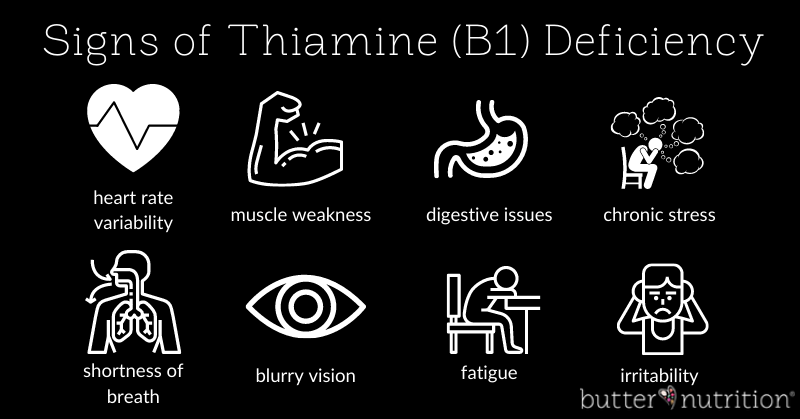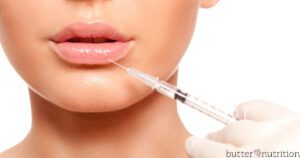
It's always been amazing to me that a country with an endless food supply and resources can coexist with so much disease. It's almost as if the eating system established was set up to fail. But maybe the answer lies in the problem, hiding in plain sight...
Enter Thiamin(e) or vitamin B1, one of the first vitamins discovered and named appropriately as vitamin B for curing beriberi. Beriberi was a disease initially discovered when it plagued populations eating large amounts of polished white rice in which the bran and germ (containing the thiamine) was removed in the polishing process. A disease caused simply by the body using up thiamine faster than it takes it in.
The Western diet provides a wide buffet of thiamine-deficient foods, so much in fact, that's exactly where the enrichment of refined grains come from. To put back in what was taken out during processing and is required by the human body for proper functioning.
The enrichment of refined foods was thought to "fix" thiamine deficiency decades ago, and it has largely been ignored since, except by a few researchers...
But perhaps here's where thiamine gets lost in translation. Enough thiamine, or in the right form.
According to Dr. Derrick Lonsdale, retired doctor, thiamine expert, researcher and author of the book, Thiamine Deficiency Disease, Dysautonmia, and High Calorie Malnutrition, thiamine is far overlooked:
"Thiamine deficiency appears to have been relegated to the annals of history, a disorder that once plagued populations. Now, however, it is generally believed that it is no longer a relevant issue, thanks to modern nutrition."
Lonsdale also adds:
"My experience of more than 30 years of nutritional therapy in the U.S.A. has clearly shown that malnutrition is extremely widespread. Thiamin figures high on the list of nutrient deficiencies, although it can also be said that is more an excess of simple carbohydrates that overwhelms the oxidative system rather than a strictly defined vitamin deficiency. Because of vitamin fortification of processed foods and the relative affluence of our present culture, we are not ready to consider that obscure symptoms, particularly those that are generally termed functional, are of dietary origin." [2]
Symptoms of Thiamine Deficiency
While thiamine deficiency is said to be rare in developed countries such as here in the US, there is likely a much larger subclinical deficiency population due to the wide range of symptomology that may be present.
To put it simply, thiamine is needed to turn what you eat into energy (ATP). Because of the foundational importance of thiamine in the body, the ramifications of deficiency can be vast and extreme. And easy to miss or mis-diagnose as another health issue.
Because of thiamine's role in energy production and the autonomic nervous system - your body's ability to adapt to your environment and shift between parasympathetic nervous system - think rest and relax to sympathetic nervous system (fight or flight), the symptoms can really feel non-specific and vary quite a bit.
For starters, there's:
- fatigue
- loss of appetite
- irritability
- dysautonomia (dysfunction of the autonomic nervous system)
- beriberi
- peripheral edema
- tachycardia
- diminished reflexes
- gait issues
- muscle weakness
- blurry vision
- shortness of breath
- heart rate variability
If enough of those apply to you, continue on to an extended list of the conditions that are connected to thiamine deficiency:
- gut issues/constipation/small bacterial overgrowth (SIBO) - The connection between thiamine and digestive issues is twofold. First, bacterial overgrowth conditions, specifically involving bacillus and clostridia species deplete thiamine. Secondly, thiamine is required to produce acetylcholine, the primary neurotransmitter used to communicate with your gut via the vagal nerve. The vagal nerve governs digestive motility and explains the upstream connection between gut dysbiosis and thiamine deficiency. You can read about this particular topic in depth here. [5,6]
- estrogen dominance [7]
- thoracic outlet syndrome (via dysautonomia, tightness of the scalene muscles due to being stuck in "fight or flight")
- postural orthostatic tachycardia syndrome (POTS)
- diabetes
- spontaneous abortion [8]
- vascular issues [9]
I don't know about you, but these lists include the most common health issues I see my clients struggling with.
Alright, if I have your attention by now, you're going to want to keep reading…
Thiamine Deficiency could be Widespread
By and large, the primary cause of thiamine deficiency is processed food because empty carbohydrates require thiamine to create energy (so they use up thiamine), but don't actually provide any thiamine. This causes you to use up thiamine at a faster rate than you are getting from your diet. This makes thiamine a vitamin that is highly subject to depletion just based on the Western diet.
Dr. Lonsdale dubbed this "high calorie malnutrition." [10]
A lower carbohydrate diet therefore would be technically more thiamine-sparing, but low carb diets can also cause other problems.
And don't forget, there are a variety of other thiamine-depleting factors like:
- alcohol abuse [10]
- chronic gut issues [5,6]
- poor absorption [10]
- increased loss (diuretics, diarrhea) [10]
- birth control pills may lower thiamine [11,12]
- bariatric surgery [10]
- dietary intake of anti-thiamines found in coffee, tea, raw fish, shellfish [10]
- genetic mutations of the SLC19a3 gene [13]
- antibiotic use [14]
These thiamine depleters are pretty popular and common, wouldn't you say?
Benefits of Thiamine
The benefits of thiamine are endless because it is absolutely necessary for your cells to make energy which has a positive impact on the functioning of your whole body. But a few very important ones to note are:
- supports autonomic nervous system balance
- reverses fatigue in both animal and human studies [15]
- improves glucose tolerance [16]
- supports gut health and motility [5,6]
- increased endurance and grip strength [17]
- anti-stress and anti-anxiety via supporting autonomic nervous system regulation [22]
- protective effect on breast cancer [23]
The Best Sources of Thiamine
When it comes to thiamine-rich foods, animal products are key. Some of the best sources of thiamine-rich foods are listed below:
- pork Italian salami 4oz 68% daily value
- pork bratwurst 85 grams 26% daily value
- chicken liver 100grams, 20% daily value
- black beans 100 grams, 16% daily value
- beef liver 100grams 13% daily value
- lentils 100 grams 58% daily value
- macadamia nuts 1 ounce 13% daily value [10,18]
- pure organic and unadulturated orange juice, 8 ounces, 10% daily value
- whole grains (unprocessed)
If the list above contains several foods you commonly crave or enjoy, maybe your body is trying to tell you something...
Thiamine Deficiency Testing
According to Elliot Overton, Nutritional Therapist and Thiamine guru of the UK, whole-blood thiamine pyrophosphate (TPPE) is the best lab test to check your thiamine levels and is available through LabCorp.
However, there are also other markers that can hint at Thiamine deficiency, such as elevated urinary pyruvate, lactate and oxalate markers that are found on an organic acids test. [6, 24]
Thiamine Supplements
There are several different forms of Thiamine or B1 on the supplement market.
Thiamine mononitrate and thiamine hydrochloride (HCL) are the water soluble forms of thiamine and the ones you'll find about 99% of the time in B-vitamin complexes and multivitamins. They however, do not have the best bioavailability and are considered inferior supplemental sources of thiamine. [5,26]
More superior and bioavailable forms are the fat soluble forms - Benfotiamine and Thiamine Tetrahydrofurfuryl Disulfide (TTFD) sold under the names of Lipothiamine and Allithiamine. Thiamine TTFD forms have the best therapeutic effect. [5, 21, 25]
According to Lonsdale, "The use of thiamin, and its disulfide derivatives in particular, is much neglected in Western medicine. It was one of the earliest vitamins to be discovered and synthesized and it is surprising that it has not been featured more in clinical reports and reviews involving nutritional therapy. The nutritional diseases have been long associated with poverty and starvation. Starvation, however, represents loss of both calorie yielding food components as well as the non-caloric nutrients, usually a slow attrition to death. If calories are maintained without appropriate vitamin and mineral content (empty calories), the outcome is quite different."
It is worth noting that Dr. Lonsdale would often note a paradoxical reaction to new thiamine re-feeding in cases of deficiency that would usually subside within a week.
According to Lonsdale, "Its therapeutic potential is largely untapped in America."
While supplements can be helpful in the short-term, they aren't a long-term solution. Because your gut bacteria produce the full spectrum of B-vitamins for you (all except B12 in substantial amounts), it's important t address the root of the problem which is often low levels of beneficial gut bacteria.
Sometimes complicated problems can actually be quite simple.
Have you ever paid attention to your Thiamine intake? Please share in the comments!
PIN IT:
References:
- Lonsdale, Derrick, MD. Thiamine Deficiency Disease, Dysautonomia, and High Calorie Malnutrition. 2018, Pages 161-211
- Lonsdale 2012 - Thiamin(e) The Spark of Life retried from http://www.tahomaclinic.com/Private/Articles4/Thiamine/Lonsdale%202012%20-%20Thiamin(e)%20The%20Spark%20of%20Life.doc
- Elliot Overton via Youtube: https://www.youtube.com/watch?v=Pi0O_fzczYA minute 23
- https://www.ncbi.nlm.nih.gov/pmc/articles/PMC1261114/
- https://www.ncbi.nlm.nih.gov/pmc/articles/PMC1375232/
- https://www.eonutrition.co.uk/post/thiamine-deficiency-a-major-cause-of-sibo
- https://pubmed.ncbi.nlm.nih.gov/17754352/
- https://pubmed.ncbi.nlm.nih.gov/22889588/
- https://www.nmcd-journal.com/article/S0939-4753(13)00159-2/fulltext
- https://www.ncbi.nlm.nih.gov/books/NBK537204/
- https://pubmed.ncbi.nlm.nih.gov/769494/
- https://www.contraceptionjournal.org/article/0010-7824(75)90025-6/pdf
- https://medlineplus.gov/genetics/gene/slc19a3/#resources
- https://nutritionreview.org/2016/12/practical-guide-avoiding-drug-induced-nutrient-depletion/
- https://www.hormonesmatter.com/ttfd-thiamine-derivative/
- https://www.ncbi.nlm.nih.gov/pubmed/23715873
- https://pubmed.ncbi.nlm.nih.gov/29966293/
- https://nutritiondata.self.com/
- https://www.eonutrition.co.uk/post/got-sibo-here-s-why-you-need-to-get-your-thiamine-status-checked
- https://www.hormonesmatter.com/ttfd-thiamine-derivative/
- https://www.ncbi.nlm.nih.gov/pmc/articles/PMC6073388/
- https://pdfs.semanticscholar.org/7c1b/53c8c4dbfdccf441a16bcc1464b2b26c9c55.pdf
- https://journals.plos.org/plosone/article?id=10.1371/journal.pone.0138318
- https://www.hormonesmatter.com/marginally-insufficient-thiamine-intake-oxalates/
- https://pubmed.ncbi.nlm.nih.gov/1776825/
- https://ods.od.nih.gov/factsheets/Thiamin-HealthProfessional/










Rachel Parish says
Hello Catherine,
I was just wondering why salami is so high in thiamine? Is it the meat itself that has so much or some other ingredient in it? Thanks!
Rachel
Catherine says
I'm actually not sure. Also, the portion I listed is a 4 ounce serving, so that is a relatively hefty serving of Italian pork salami.
Jess says
Which of the 3 forms of Thiamine you described is best for those with gut issues and poor absorption?
Catherine says
Hi Jess,
It's complicated because it depends on what is going on in the gut. Some with SIBO-like symptoms may not be able to tolerate the TTFD versions due to the sulfur and may need to experiment with smaller amounts of thiamine mononitrate or thiamine HCL. Some do fine will all versions, so there are no clear rules. Some experimentation or working with someone may be necessary depending on what is going on in your body.
Abundantly,
Catherine
Jessica Nuttall says
I've heard about TTFD being a possible issue due to the sulfur.
Thank you!
lee says
Thank you, you gave me several facts that I have not read in all the other sites I've been reading. I appreciate that very much. ex. urinary pyruvate, lactate and oxalate markers also superior and bioavailable forms are the fat soluble forms, also genetic mutations of the SLC19a3 gene; he vagal nerve governs digestive motility and explains the upstream connection between gut; ability to adapt to your environment and shift between parasympathetic nervous system (so maybe it isn't my adrenals); and coffee depletes thiamine, and I drink a lot of coffee all day long. Thanks
Catherine says
You are very welcome.
The calcium:phosphorus ratio is also linked to balance of the autonomic nervous system, and is often disturbed in those supplementing high dose vitamin D supplements: https://butternutrition.com/hair-tissue-mineral-analysis-significant-ratios/
Abundantly,
Catherine
Michael says
Can I take Vitamin B1,B6,C,D3 all together?
Ray says
Thanks for the great article! I've been aware of Vit. B1 deficiency for some time, but as another commenter noted, some of the things mentioned here were new to me. I started drinking coffee again a little while ago. I was only drinking one small cup in the a.m. (4 oz.) periodically, but then started drinking it every day in the a.m. Sometimes I would drink one small cup in the afternoon. After starting to drink it every morning my gut started to give me major issues. Now I know why. I figured it was the coffee but now understand why it's the coffee which is depleting my thiamine. I started having some of the other symptoms as well. My hair started to fall out as well which I attributed to the coffee too. But I think that was because coffee blocks the absorption of iron. I have come to the conclusion whereas coffee may have some benefits, I believe it's negative side affects outweigh the positive, at least in my case!
Hannah says
Hi!
I see that some of those thiamine supplements (the alternative/fat-soluble forms) contain very high amounts of thiamine (12000% daily value, etc.) in only one pill. Do you think this could be an issue long-term? Since the thiamine is fat-soluble, is it still excreted in the urine or can it be stored?
Thanks!
Catherine says
Hi Hannah,
Great question. I'm not a fan of taking anything synthetic and in isolation longer than short-term. Supplementation of high dose vitamins should only be done in verified deficiency situations while working to address the root cause (ie. diet, stress and gut health — your gut bacteria make thiamine).
Abundantly,
Catherine
Mary Marston, RN says
Do you feel benfotiamine is adequate or should one also take thiamine?
Kim says
I background disease and have neurosurgery 3 times to remove affected intestines. What are the idea that I have a thiamine deficiency?
Kim says
Supposed to read " I have crohns disease and have had surgery 3 times to remove affected intestines ". How likely is it that I ha e a thiamine deficiency?
Brian Garner says
It is interesting to read this article.
After an epileptic seizure on August 2 (Yes, I have TBI caused epilepsy), during my five day stay in the hospital, my general practitioner started me on Thiamine. Initially it was by IV and now being taken orally.
Thank you for the article. I have a referenced article to read after my supper.